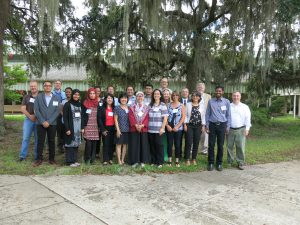Toxins produced by harmful algal blooms (HABs) accumulate in marine resources and are a major cause of human seafood poisoning around the world, which impedes economic development and international trade. Tests developed by NCCOS to measure levels of HAB toxins, known as receptor binding assays (RBA), area standard method for regulatory use and are in various phases of implementation in testing laboratories worldwide.
NCCOS hosted an International Atomic Energy Agency (IAEA) workshop July 18-22 at in Charleston, SC. where participants received training on the the validation, performance, and regulatory application of RBAsfor HAB toxins that cause paralytic shellfish poisoning and ciguatera fish poisoning. Resource managers from seven Asia-Pacific countries met with scientists and managers from NOAA, IAEA, U.S. Food & Drug Administration, California Department of Public Health, and the government of Catalonia in Spain, to address the performance and evaluation of biological testing methods, availability of reference materials for algal toxins, development of effective monitoring strategies, quality assurance in laboratories, data evaluation and management, and the identification of social science needs pertinent to testing for HAB toxins.

The workshop was part of the IAEA Asia-Pacific regional project “Supporting the Use of the Receptor Binding Assays to Reduce the Adverse Impacts of Harmful Algal Toxins on Seafood Safety” and NOAA and IAEA Collaboration on Harmful Algal Blooms executed though a NOAA/IAEA Practical Agreement.
For more information, contact Tod.Leighfield@noaa.gov
